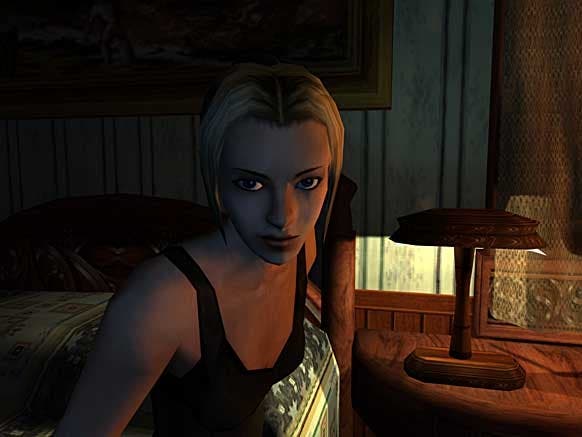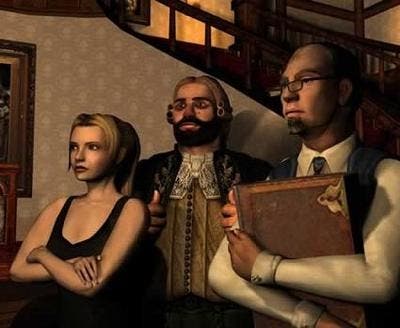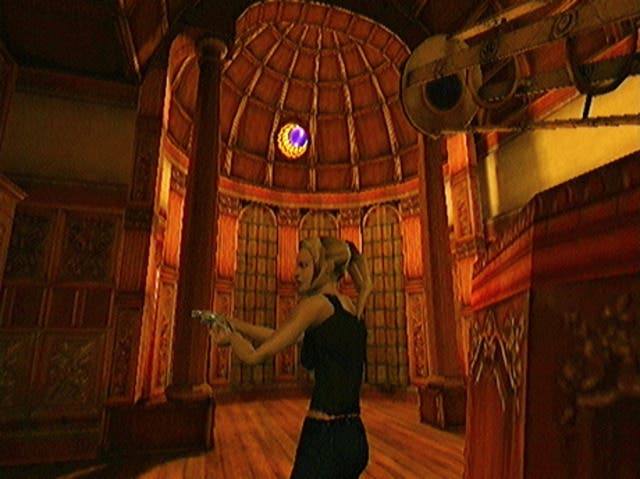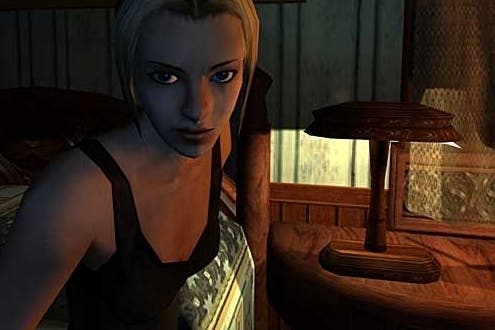Eternal Darkness: Sanity's Requiem retrospective
The Elder Gods' guide to scrapbooking.
Eternal Darkness: Sanity's Requiem wants you to be afraid. Not of ravenous b-movie horrors, nor of dwindling ammunition, but of indescribable Ancients lurking beyond existence, intent on subjugating our world. It wants to question your sanity, to weaken the boundary between game and reality as you struggle to unravel a trail of murder and arcana across 2000 years.
An unlikely collaboration between Nintendo and Ontario-based developer Silicon Knights, Eternal Darkness is a Lovecraftian ensemble piece, of ordinary men and women struggling to prevail against an enemy whose very existence threatens to drive them to madness. Called in to identify the decapitated corpse of her grandfather in his Rhode Island mansion, you take the role of Alexandra Roivas, the modern-day focal point for an intricate web of memoirs concealed around the house. Scattered throughout history, each of the twelve playable characters tells a tale of an ill-fated encounter with forces far beyond their comprehension. They are scholars, monks, architects, war photographers, fire-fighters; not battle-hardened warriors, but pitiful humans cowering in the shifting shadows of monstrous gods.
Those who take a stand against the darkness are crushed, devoured, or annihilated, while others attempt to flee but cannot so easily escape the things they've seen. Yet each little act of heroism, each moment of defiance against the incomprehensible darkness, builds on those that have gone before, to offer humanity a slim hope of salvation. Knowledge transcends time, their stories preserved in the Tome of Eternal Darkness - a supernatural text encountered by each character, in an ethereal vault carpeted with screaming faces and lined with broken statues of those who've gone before - as an essential reference for Alex as she pieces together her grandfather's research and the events leading up to his murder.

Given the impressive scope of the story, it initially seems limiting that the action is confined to only four different locations, each environment reused twice or even three times for different characters. However, Silicon Knights neatly avoids the fatigue of such repetition by emphasising the development and decay of each location over the centuries. A Khmer girl trapped inside a temple in 12th Century Cambodia explores halls of crisp yellow stone and freshly-carved bas-reliefs, while the pith-helmeted adventurer who uncovers the same temple in 1983 is faced with an overgrown ruin, decorative façades shattered by time and the intruding jungle. The Amiens chapel where a loyal messenger seeks to protect the Emperor Charlemagne from assassins is relegated to a mere side-chapel of the grand cathedral which rises around it, which in turn becomes an impromptu military hospital by the outbreak of the Great War, haunted by the dreams of the walking wounded and the screams of the dying.
Other than hacking your way through a menagerie of undead, most of your time with Eternal Darkness is spent pondering the various puzzles that obstruct your progress. Given the emphasis on problem solving it's a relief that most of them rise above the nonsensical 'find an object shaped like this slot' trope, and even when such puzzles do appear, their context often contributes to the oppressive atmosphere. To progress deeper into the haunted catacombs beneath Amiens Cathedral, you're required to stab a marble sarcophagus - bearing the likeness of your sole ally and confidant - with a sacrificial dagger. It's a simple lock-and-key mechanism, given horrific connotations by the blood-curdling scream which echoes around the room as the promised door slides open to reveal a bloody altar upon which your friend is splayed.
Other puzzles involve manipulating the surprisingly complex magic system: spells are built from a vocabulary of runes, and while codices and spell scrolls can be located to detail every component, the system promotes experimentation. Many of the game's later puzzles and boss fights revolve around your understanding of the vocabulary of spell-casting and a fair degree of lateral thinking.
Yet it's in the quiet moments that Silicon Knights' confidence in weaving atmosphere shines through. As the framing device for the rest of the adventure, Alex's story plays more like a graphic adventure than a traditional survival horror, and in the absence of something to fight, her unease is brought to a simmering peak by the ominous emptiness of the mansion. There are no dogs leaping through windows, no zombies lurching out of the gloom; long after most games would have cracked and granted you the catharsis of carving your way through monstrous hordes, here the only escape is into the madness-inducing pages of history. You're given enough rope to hang yourself as tranquil paintings shift to desolate hellscapes, as statues track you through the spacious halls, as screams of terror and long-forgotten gunshots ring out from the bricked-up servants' quarters. Even if not for the evil at work beneath the mansion, it would be easy to fear for your sanity in the silence and solitude.

Sanity is indeed in short supply, and losing it contributes to many of the game's most memorable moments. A character's sanity plummets whenever they are noticed by an enemy, and can initially only be restored by finishing off a downed opponent in a flurry of panicked violence. While losing sanity has negative connotations for your health, the wider effects succeed in making not only the character but also the player complicit in teetering on the brink of insanity. At first the effects are subtle, the camera tilting at unsettling angles, trickles of blood seeping through the peeling wallpaper, whispers in otherwise empty rooms.
Phones ring with no-one on the other end, while urgent banging on the front door startles you out of your puzzle-solving fugue. Enter a room without sufficient sanity and you may not arrive where you intended to, or your arms may fall off, or you may sink through the floor like quicksand. As your sanity slips further, as you read more tales of unspeakable horror from the Tome of Eternal Darkness and your ancestors and associates encounter ever more terrifying abominations, the game begins playing you.
Is that a fly crawling across your screen? What about the message informing you that your controller is unplugged just as a posse of Chattur'gha's finest turn their unholy gaze on your defenceless meatsack? Is that real, or are you buying into your character's insanity? What about when your TV unexpectedly switches itself off, plunging you into darkness, the snarling of unknown horrors loud in your ears?
Each sanity effect lasts just a few seconds, before a flash of light and a muttered denial of the things you've seen erase the incongruities and place you back in the action. Some are inarguably more successful than others, and the years haven't always been kind: it's harder to believe in the game switching off your flatscreen TV when the effect is accompanied by the distinctive compass-point starflash of a cathode-ray tube, and the agonising forced deletion of all game saves was rather shattered in my most recent playthrough by the occurrence of a succession of genuine save file errors.

It's by no means a perfect game: the combat can be clunky, sometimes even utterly comedic as you lop appendages from clustered zombies flailing in your general direction, progression occasionally devolves into tedious pixel-hunting - the envelope down the back of a dresser is a particularly heinous example - and the relative linearity of the puzzles can leave you stumped with no recourse other than online walkthroughs. While the magic system is fascinating at first, mastery of its nuances threatens to destroy the tension of the early game as you bulldoze your way through the undead in a devastating swirl of magical energy. Once you realise that with the tap of a button you can magically refill your sanity meter at virtually zero cost, there's no reason not to, and one of the game's most fascinating features is undone. Yet these are faults resulting from excessive ambition, easily forgiven.
Eternal Darkness launched to critical success and commercial apathy, selling less than half a million copies worldwide. Nintendo has since renewed their claim to the IP every few years and the franchise remains fondly remembered by those who played it, but when Dyack and the core team behind Eternal Darkness launched a new studio, Precursor Games, to develop Shadow of the Eternals as a crowd-funded spiritual successor, it seemed the gaming public's goodwill towards Silicon Knights had finally run out. After the much-publicised failure of Too Human, a catastrophic failed lawsuit against Epic Games, and the atrocious X-Men: Destiny, many expressed a lack of faith in Dyack's abilities to recapture the dark magic of his studio's heyday. The crowd-funding campaigns failed, and any hopes for a successor to Eternal Darkness's crown were lost.
Even today, it remains an oft-forgotten gem, the intricacies of its story and absorbing atmosphere resilient even as its brilliance is dulled by the passing years. Less well-imagined survival horror games continue to flourish while Eternal Darkness lies dormant, in the dark places beneath the earth. Some day, perhaps, it will awaken, arise, and consume us all.



